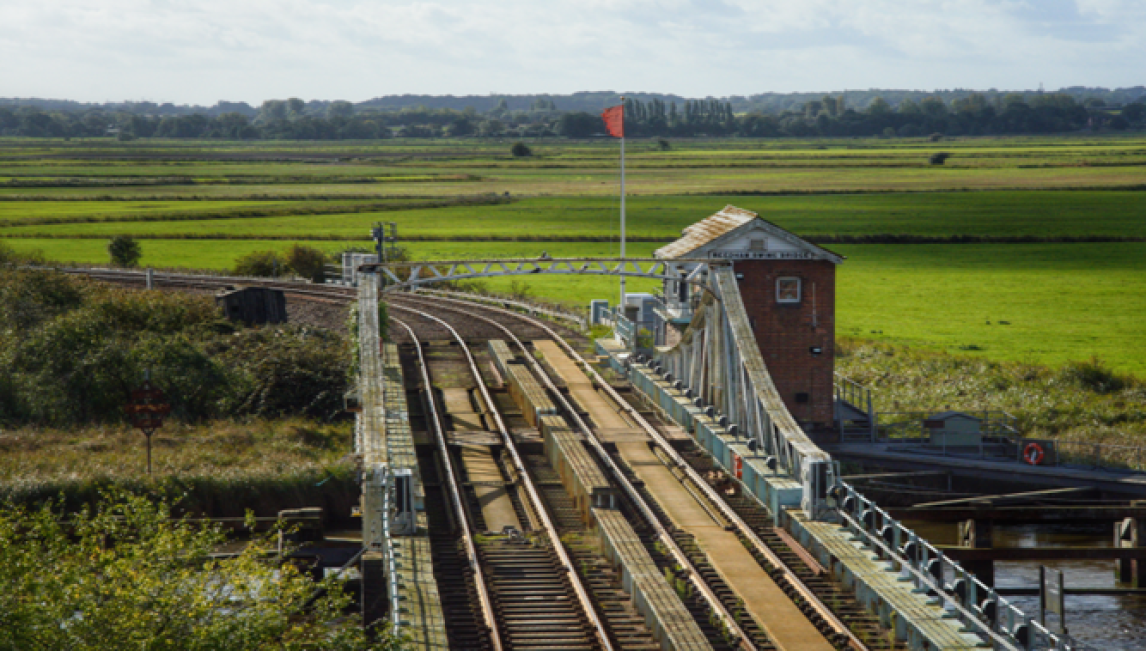Published on: Friday, 13 October 2023
Last updated: Friday, 13 October 2023
Greater Anglia and Network Rail are implementing actions to tackle slippery autumn rail conditions – following an improvement in autumn-related delays last year.
The two organisations work together every year to minimise the effects of autumn on train performance.
Until 15 December, trains from Norwich, Diss, Stowmarket and Ipswich heading towards London before 07.30am (Monday to Friday), now depart a few minutes earlier than usual.
The changes, which are made every year, are brought in to ensure that passengers still arrive in London on time by giving drivers time to brake and accelerate if autumnal weather and compacted leaves cause slippery conditions on the tracks.
Leaves on the line can pose problems for the railway as they stick to damp rails and passing trains compress them into a thin, slippery black layer on the rail which – much like black ice on the roads – can affect braking distance and reduce traction and acceleration.
This means train drivers must slow down earlier for stations and signals to avoid overshooting them. They must also accelerate more gently to avoid wheel spin. All this can increase journey time and lead to delays for passengers.
During the autumn period (18 September 2022 – 7 January 2023), delay minutes due to adhesion and autumnal issues were down 20% compared to the previous year.
Greater Anglia’s new trains have been credited with handling the challenges of the ‘leaf fall’ season significantly better than the operator’s old fleet.
Greater Anglia’s Engineering Director, Martin Beable, explains,
“Most trains are fitted with a system called ‘Wheel Slip Protection. This is the equivalent of the Anti-lock braking system you have in your car and prevents trains from skidding which can damage their wheels.
“Our brand new intercity, regional, and electric commuter trains are fitted with the very latest Wheel Slide Protection systems which have been thoroughly tested and developed to provide optimal performance in difficult conditions.
“This means that any sliding on greasy rails - with lots of leaves compressed on the top of the rail – is limited and causes less damage to the wheels and track.”
When it is necessary, the trains also deposit a small quantity of sand onto the rail which helps the train wheels to grip, particularly where there is leaf contamination. Train drivers can also deploy the sand manually as a preventative measure when they are approaching leafy areas, to keep services running smoothly.
In addition, Network Rail Anglia is deploying its six rail head treatment trains which blast leaves off the lines with high-pressure water jets.
Together they are set to clock up 100,000 miles during the leaf-fall season. They started working on 25 September and will keep running until 15 December to keep rails clear across Norfolk, Suffolk, Cambridgeshire, Hertfordshire, Essex, and East London.
This season, the rail head treatment trains will be fitted with GPS, which can show lines that have not been treated and send alerts when jetting has been unachievable, allowing better management of affected areas.
A specialist road-and-rail vehicle called the “Sandrover” is used to scrub leaves on the Marks Tey – Sudbury line, which cannot be accessed by the big rail head treatment trains.
Wherever needed, specialist leaf-fall teams manually carry out inspections and clear compressed leaves from the rails.
Network Rail also uses drone and artificial intelligence technology to keep an eye on vegetation growing near the tracks.
James Vincent-Smith, Network Rail’s seasons specialist for Anglia, said:
“Autumn is always a challenge for the railway, but our teams will be working hard every day to keep passengers moving.
“We plan all year round to prepare for leaf-fall season, constantly refining our strategy and looking at how the latest innovative technology can help us to be even more effective.”
Customers using early morning weekday trains from Norwich, Diss, Stowmarket and Ipswich are advised to check departure times for journeys until 15 December.



